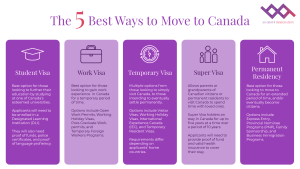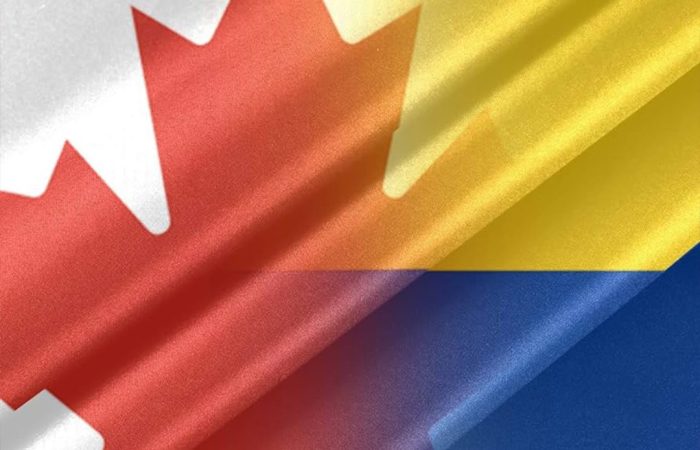Canada has a reputation for being one of the most popular and desirable countries in the world for travel and immigration. So popular, in fact, that the Canadian Government granted over 431,645 new permanent residencies in 2022.
It’s unsurprising that so many people continue to flock to Canada year-after-year. The ‘Great White North’ is famous for its polite residents, photogenic landscape, and high quality of life. Since the country was founded in 1867, and for the thousands of years of indigenous occupation prior, Canada has become a melting pot of cultural celebration and an idyllic destination for foreigners looking for a change of scenery and a better way of life.
While the dream of moving to Canada can become a very real possibility, the steps towards obtaining entry to Canada can be quite complicated and off putting to individuals and families who want to learn more about the process.
In this blog, we will break down the 5 best ways to move to Canada, and provide advice from our group of professionals to make your journey as seamless and enjoyable as possible. For easy-to-follow Immigration Checklists, check out our Resources page.
Foreign-born residents of Canada usually apply to immigrate through one of the following channels:
- Student Visas
- Work Visas
- Temporary Visas
- Super Visas
- Permanent Residency
Student Visas
Those looking to take advantage of a top-notch education by studying at one of Canada’s esteemed universities will need to apply for both a visa to enter Canada (either an Electronic Travel Authorization (eTA) or a Visitor Visa), and a study permit.
In order to obtain a study permit for Canada, the applicant will need to meet some requirements. For example:
- They will need to be enrolled at a Designated Learning Institution (DLI)
- They will need to be actively working towards completing their studies
- They must meet the minimum requirements of their student visa (this includes providing police certificates, proof of minimum funds, and an acceptance letter for their institution)
There are exceptional cases where someone looking to study in Canada may not need a study permit. For example, if a study program has a duration of less than 6 months, they are a refugee, or they are only planning to attend pre-school, primary school, or secondary school and their parents are already allowed to work and study in Canada.
There are also schemes that allow students to work in Canada after graduation. AG Group’s Director of Immigration, Mercedes Carreno, says, “If you enrol on a two-year program with one of our Canadian colleges or universities, you can work for three years”.
To find out if you need to apply for a study permit to attend your favourite institution, book a free consultation with one of our immigration professionals today.
Even after their graduation, foreign students still have the opportunity to remain in Canada by obtaining a Post-Graduation Work Permit (PGWP), which allows students who have graduated from a participating post-secondary Canadian institution to gain work experience by working for any employer in Canada without the need of a job offer.
Gaining this work experience comes in handy for individuals intending to apply for permanent residency and Canadian citizenship in the future.
Work Visas
Immigrants have multiple streams to allow them to move to Canada as a worker. Canada is known for offering good salaries and a lot of employment opportunities, leading to a huge number of people born in other countries making the life-changing decision to immigrate and explore these opportunities.
Individuals looking to work in Canada for a temporary period of time can apply for an Open Work Permit, a Working Holiday Visa, a Post-Graduate Work Permit, or through the Temporary Foreign Workers Program.
Those looking to work in Canada permanently will first need to apply for a temporary work visa, and later apply for permanent resident status. Before applying for a work visa for Canada, anyone with the intentions of working must first apply for a work permit.
To apply for a Canadian work permit, there are some requirements that need to be met by individuals:
- They must prove their intention to return to their home country when their work permit expires
- They must prove that they will not be participating in prohibited work, or work for employers that provide prohibited work such as strip clubs, escort services, or erotic massage parlours
- They must meet the minimum requirements of their work permit (an open work permit has different requirements to a specific work permit)
There are separate requirements for individuals applying for a temporary work visa from inside Canada and from outside of Canada. For those inside Canada:
- They must currently be in Canada with a valid study permit or work permit that will expire soon
- They must have graduated from a Canadian institution
- They must have a temporary resident permit that is valid for more than 6 months
- They must be a refugee or a protected person, have applied for refugee status in Canada and currently be waiting for a decision, or have received a rejection for refugee status but be unable to leave Canada due to other reasons
For those applying from their home country, or any country outside Canada, they must meet the requirements of a Temporary Work Visa, in addition to the requirements for a work permit.
The Government of Canada website offers a profile assessment to individuals considering applying for a work visa. Mercedes Carreno advises all candidates to take advantage of this assessment: “Each case is different to their profile – the best way to see if you qualify is to do a profile assessment”.
To explore your options when it comes to applying for a work permit, book a free consultation with one of our immigration professionals today.
Temporary Visas
Temporary visas of different kinds are offered by the Canadian government to anyone looking to visit Canada as a tourist, student, or worker, for a temporary period of time. Anyone exploring the temporary visa options should look consider applying for a Visitor Visa (also known as a Temporary Resident Visa), a Study Permit or a Work Permit (as mentioned previously in our blog), a Working Holiday Visa, a Temporary Resident Permit, or through the International Experience Canada program.
For those simply looking to take a vacation in Canada, or transiting through Canada on their travels, a Visitor Visa may be required. Visitor Visas are typically issued for a period of up to six months, and may require applicants to provide evidence of sufficient funds, ties to their home country, and their intention to leave Canada after their trip.
A Working Holiday Visa is available to individuals between 18 and 35 years of age from participating countries. They are designed as a way to experience life in Canada, where these visa holders can live and work for up to a year. To apply for a working holiday visa for Canada, individuals will need to meet these requirements:
- They must provide proof that they are a citizen of a has a bilateral youth mobility agreement with Canada, and that they meet the age requirement of that country
- They must prove that they meet the specific requirements of their country of citizenship, as they differ from country to country
Another scheme that is aimed to help young people gain valuable work experience in Canada is the International Experience Canada (IEC) program. The requirements, again, can vary depending on the country of origin for each applicant, as well as the category of the IEC for which they are applying. The different categories are:
- Working Holiday
- Young Professionals
- International Co-op
Generally speaking, an applicant should prepare the following when applying for one of the International Experience canada programs:
- They must have proof that they are from a country that participates in the program
- They must have proof that they meet the age requirements for their program
- They must have a valid passport
- They must have proof that they meet the character and health requirements (this could mean undergoing a medical exam and/or acquiring a police certificate)
- They must provide proof that they have health insurance to cover the length of their intended stay in Canada
- They must have proof of funds to remain financially stable while in Canada
- They must prove that their meet the minimum language efficiency requirements
- For some cases, they may need to meet specific educational or professional requirements
A perk of gaining a temporary visa is the opportunity to study without applying for a student permit. Director of Immigration for AG Group says, “While on a temporary visa, you may enrol on a 6-month study program without having to apply for a student permit”.
Those interested in applying to any of the International Experience Canada programs should consult a professional before they submit their application. Schedule a consultation with an AG Group Immigration agent, or download our Temporary Visa Checklist for easy-to-follow guidance.
If an individual does not meet the requirements of any of the above temporary schemes to enter Canada, but still has a valid reason for wanting to visit, they can apply for a Temporary Resident Permit (TPR). These permits are granted on a discretionary basis and will be reviewed based on the specific purpose and duration of each application.
Super Visas
Super visas are designed to reunite family members for an extended period of time. This option is available to the parents and/or grandparents of a Canadian citizen or permanent resident.
A super visa allows eligible family members to stay in Canada with their loved one for up to five years at a time over a 10-year period. The super visa holders can leave and re-enter Canada multiple times during this period.
Applicants will, as usual, have to meet the eligibility requirements to be granted a super visa:
- They must provide proof of their relationship to the Canadian citizen or permanent resident and provide a letter of invitation from them
- They must meet the minimum financial requirements and provide proof of funds
- They must have valid health insurance for a minimum of one year
A super visa is a great opportunity to visit family members for a longer period of time than a regular visitor visa, although the requirements are more strict. Download our Super Visa Checklist to ensure you are prepared for your application.
Permanent Residency
With Canada being a highly desirable country to live in, it’s not surprising that many people want to move here permanently, rather than through a temporary route. Mercedes Carreno advises, “You’re a great candidate for permanent residency if you are between the ages of 25 and 35, and you hold a 4-year Master’s Degree”.
Canada offers several routes to gain permanent resident status, including:
- Express Entry
- Provincial Nominee Programs (PNPs)
- Family Sponsorship
- Business Immigration Programs
The Express Entry route is usually available for those who have gained valuable work experience that is considered to be beneficial to Canada. The work experience could have been gained within Canada or overseas, and can be determined with the points-based system that the scheme implements.
The points-based system applies to three federal economic immigration programs; the federal Skilled Worker Program, the Federal Skilled Trades program, and the Canadian Experience Class.
To determine their eligibility and tally up the number of points that they can achieve, those interested in applying for express entry should look at the Comprehensive Ranking System on the official Canadian immigration website.
The Provincial Nominee Program allows individuals a chance to apply to be nominated by the Canadian province or territory they are looking to settle in. The province or territory will nominate applicants who meet particular skill and work experience requirements that the province or territory deem desirable, based on their economic and market needs.
The eligibility requirements for each provincial nominee program take into consideration factors such as education, work experience, language proficiency, and adaptability to the specific province or territory.
While other routes to Canadian permanent residency rely on the person immigrating to apply, the family sponsorship pathway is an opportunity for Canadian citizens and permanent residents to sponsor their close family members to come to Canada and become permanent residents themselves.
Family sponsorship is only available to:
- The spouse, common-law partner, or conjugal partner of a citizen or permanent resident
- The dependent children of a citizen or permanent resident
- Parents or grandparents of a citizen or permanent resident
- Other eligible relatives under specific circumstances (for example, orphaned nephews and nieces)
For this scheme, both the sponsor and the family member will have to complete applications, with the sponsor needing to provide willingness to sponsor and the funds to support their family member when they are in Canada. Download our Permanent Residency Checklist to ensure you have everything prepared for your application.
Business Immigration Programs for Canada are designed to reach those with entrepreneurial and business skills looking to invest or start a business in Canada. Some of the available business immigration programs include:
- Start-Up Visa Program
- Self-Employed Persons Program
- Quebec Business Immigration Programs
The Provincial Nominee Programs for some provinces and/or territories can also offer business immigration programs to individuals who will contribute positively to the economy.
The eligibility criteria for most business immigration programs are slightly more complex than other Canadian immigration schemes, with applicants usually being required to meet criteria for investment, business experience, language proficiency, and net worth. Applicants are often required to submit a business plan or proposed investment, and will usually be interviewed about this plan.
As always, it’s best to chat with an experienced immigration professional. AG Group offers Immigration Consultations to ensure your immigration process goes as smoothly as possible, as well as Immigration Checklists to help you prepare for your application.




